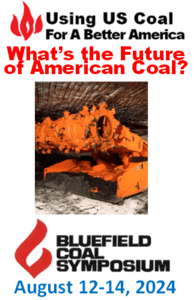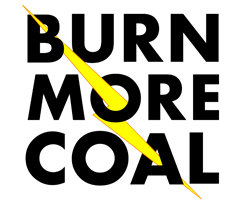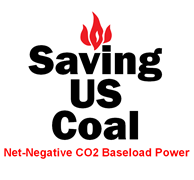
 






.gif)



|
Signature Sponsor


January 11, 2019 - On December 28, 2018, Duke Energy asked the U.S. Securities and Exchange Commission for permission to omit BURN MORE COAL’s shareholder proposal from Duke’s 2019 proxy materials. If granted, it would mean no shareholder vote at Duke’s 2019 annual meeting on our proposal for a greenwashing audit. Below is BURN MORE COAL’s response.
January 10, 2019
Office of Chief Counsel Division of Corporate Finance U.S. Securities and Exchange Commission 100 F Street, N.E. Washington, DC 20549
Re: Request by Duke Energy to Omit Shareholder Proposal of Steven J. Milloy
Dear Sir or Madam:
I am responding to the December 28, 2018 request from Duke Energy (“Duke”) to omit my shareholder proposal (the “Proposal”) from its 2019 proxy solicitation materials.
Not only does Proposal comport with all proxy rules, but Duke’s request is false and misleading, and should be denied.
Introduction
The fundamental pillars of the federal securities laws and regulations are their (1) disclosure and (2) anti-fraud provisions.
Duke has touted its costly and voluntary environment-related activities in numerous and various public statements and documents.
The Proposal merely requests that Duke report to shareholders on the actual and tangible benefits of these activities.
The goal of the Proposal is to ensure, via disclosure, that Duke’s touted benefits are bona fide. Duke has not already implemented this request.
The Proposal is, therefore, entirely consistent with the fundamental pillars of federal securities laws, including the proxy solicitation rules, and the extensive Commission precedent refusing registrant efforts to dodge accountability to shareholders via disclosure/reporting.
I will now address Duke’s specific assertions in its December 28 letter.
The Proposal is not vague and misleading.
Contrary to Duke’s assertions, the Proposal is straightforward and readily understandable. It explains in plain English its purpose and even provides examples of Duke’s touted claims and the sort of reporting requested.
Duke, for example, touts anticipated reductions in carbon dioxide (CO2) emissions as a principle justification for its voluntary shuttering of coal plants.
But these plant closings and CO2 cuts are not required by any law or regulation. As the CO2 cuts are not, by themselves, obvious, actual or tangible benefits to anyone or anything, for the reasons explained in the Proposal itself, the Proposal merely requests that Duke explain to shareholders what the actual benefits of the CO2 cuts are.
Duke’s request to the Commission is disingenuous as it merely pretends not to understand what has been requested. The reality is more likely that Duke does not want to be accountable to shareholders or anyone for any unsubstantiated claims.
The Proposal does not seek to micromanage Duke’s choice of technologies.
The Proposal merely requests that Duke report to shareholders. Disclosure to shareholders is a fundamental pillar of the securities laws. Disclosure is not micromanagement. Disclosure does not limit Duke’s technology choices. The purpose of disclosure is to inform shareholders so as to prevent mismanagement and fraud.
The Commission has previously and numerous times rejected arguments that reports to shareholders are efforts to inappropriately interfere in ordinary business operations, including reports calling for disclosure of political contributions, charitable contributions, cost-and benefits of climate-related activities, and many more. The Proposal is no different than any of those.
Climate change is a significant policy change.
The environment, especially climate, are significant policy issues ? as the Commission has previously determined with many previous shareholder proposals.
The notion that Duke now does not consider climate to be a significant policy issue is as ridiculous as it is disingenuous. Consider the following:
• Climate is a major rationale offered for the shuttering of Duke’s coal plants. See https://www.duke-energy.com/our-company/environment/global-climate-change.
• Duke has an entire web page dedicated to the “Environment.” See https://www.duke-energy.com/our-company/environment.
• Duke has an entire web page dedicated to “Sustainability.” See https://www.duke-energy.com/our-company/sustainability.
• In March 2018, Duke issued a “2017 Climate Report to Shareholders.” See https://www.duke-energy.com/_/media/pdfs/our-company/shareholder-climate-report.pdf.
The Proposal asks for Duke to evaluate the actual and tangible benefits of its voluntary environmental and climate activities. Duke’s activities are costly. Shareholders want to know what the benefits are so that the costs may be properly evaluated.
Duke has not already substantially implemented the Proposal.
Doing things is not the same thing as assessing and reporting on whether the things done have produced any benefit to anyone.
Duke states, for example, that its “2017 Sustainability Report details much of Duke Energy’s efforts to reduce greenhouse gases…” The greenhouse gas cuts are not required by law or regulation. They are voluntary. They cost money and require management’s attention and efforts. But there is no mention of how anyone or anything (e.g., shareholders, ratepayers, local communities, the climate, the environment) may have benefited from them.
If voluntarily cutting carbon dioxide emissions has actual and tangible benefits, Duke should disclose to shareholders what those benefits are. Have financial benefits accrued to shareholders? Have ratepayers saved money? How has the climate or environment improved? If there are no benefits, then that should be candidly disclosed.
If the benefits are hypothetical, imaginary or controversial, that should be disclosed. Duke has apparently made no such assessments, much less disclosed them, in any of its reports.
How are shareholders supposed to monitor and evaluate the use of corporate resources with the sort of unsubstantiated claims presented in the 2017 Sustainability Report?
In none of the reports or documents cited by Duke in its December 28 letter has the company specified what the actual and tangible benefits of its voluntary activities are. It is not clear how merely cutting emissions is a benefit. What are the benefits brought about by cutting emissions? Shareholders want to know.
Conclusion
Duke’s request for permission to omit the Proposal from its 2019 proxy materials should be denied.
If you have any questions, I may be contacted at xxx-xxx-xxxx. A copy of this letter has been sent to Duke and its counsel.
Sincerely,
/s/
Steven J. Milloy |
 











|